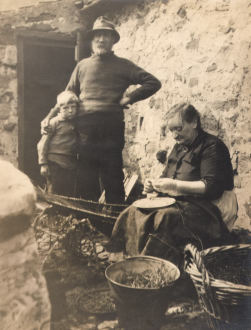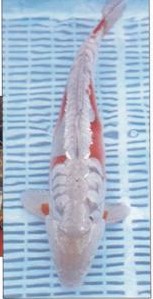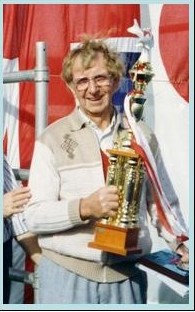Mac Wilson - Koi Pioneer.
Mac Wilson was one of the original pioneers of Koi Keeping in this country. A remarkable man that played no small part in the History of UK Koi Keeping. We publish below an article by Mac that described his early life, and follow it with one of our own that outlines Mac's part in the BKKS' History.
My life with fish or Full Circle
By Mac Wilson.
First printed in Oct 1994 edition of Spotlight.
We started keeping fish at a very early age, 6-7 years old. I was born on an island (Holy Island or Lindisfarne), devoid of all artificial entertainments and distractions. Television and tape recorders were unheard of, and radio was very much in its infancy, ‘cats whiskers’ and so forth.
We lived very close to nature, which filled our day. On the far or wild side of the island, were some holes in the rocks which only got refreshed with sea water on the high, spring tides. It was there where we kept our fish. In return for menial tasks on the fishing boats, such as washing the decks and cleaning the scuppers out, which were alive with goodies, we stocked our pools. Starfish, urchins, crabs, you name it. Also, the men used to keep the undersized fish for us. And off we would go with our prizes; we had codling, whiting, haddock, pollack and any strange fish we could get. I well remember the puffers, as they were called, fish about 8” to 10” long, which if you disturbed or teased them, would blow themselves up to the size of a football.
 Our days were full. Out of school and off to feed our fish. From under the seaweed, we gathered and shelled mussels, limpets and soft crabs. The codlings got quite tame on the soft crabs. They loved them, like young koi on daphia. However, if they didn’t escape when the pool was open to the sea, they nearly always went blind. The old men reckoned it was because they couldn’t get away from the light. We tried to block the entrances with rocks and big stones, really hard work for nippers, but the sea soon shifted them.
Our days were full. Out of school and off to feed our fish. From under the seaweed, we gathered and shelled mussels, limpets and soft crabs. The codlings got quite tame on the soft crabs. They loved them, like young koi on daphia. However, if they didn’t escape when the pool was open to the sea, they nearly always went blind. The old men reckoned it was because they couldn’t get away from the light. We tried to block the entrances with rocks and big stones, really hard work for nippers, but the sea soon shifted them.
One of the most fascinating creatures was the octopus. They were the masters of camouflage, whatever colour you put them into, red, white, blue, or black they would change to that colour in minutes. And you couldn’t diddle them, if you hid them from the sea so they couldn’t see it; they always took the shortest escape route. It was really uncanny how they knew. Needless to say, we never kept them long, but we didn’t really worry, for they were the worst predators we knew. If they got hold of a crab or lobster, they would suck every last bit of flesh out and leave nothing but an empty shell. But yet if you teased a lobster underwater with a stick, he would grab it with his big claw and chop bits off the end with his sharp scissor claw, no trouble at all. I think now the octopus had mesmerising powers of some kind, or doped their victims somehow, for really a lobster had the power to chop the arm off an octopus if it could get at it.
Mac aged 5 with his Grandparents circa 1926.
These were halcyon days for us. We lived on the foreshore and the wild side of the island from dawn to dusk. Nothing moved without us knowing about. Rather than waste time going home, we learned to light fires without matches and cooked whatever we could get hold of.
Well below the high water mark, there were some little fresh water springs, so we could always get a drink. Sometimes, holiday-makers’ children used to come with us. Our great prank would be, with cupped hands, have a drink at a spring rock pool. “Ha! That was good!” and point to another a yard away say, “Try that one, it’s nice and clean”. After a lot spluttering and spitting out of salt water, they thought we Islanders were really tough, but we never revealed our secret!!
In season, we collected gulls’ eggs and boiled them. Far tastIer than hens’ eggs and twice the size. Peewits’ eggs were another delicacy. We would lie in wait for the hen bird to go to her nest when she thought it was safe. One of us would mark the spot, while the other went where the nest was. If you looked for the nest haphazardly, you could spend hours looking. Although the birds lay on open ground, the eggs are very hard to find, for they make a very little nest and the eggs are well camouflaged.
The Eider ducks were another of our favourites. We used to adopt one or two nests each and would lie for hours watching them. The male Eiders never came near the nest, as they would be congregated in flocks out to sea, but you knew by the quantity of drakes how many ducks were sitting. One of the wonders of nature was, as soon as the eggs were hatched, the mother took her brood straight out to sea, so for the first six weeks of their lives, they never touched land; little balls of grey down being tossed around in the spray. How those little things survived, I shall never know. Why we treated the Eiders with care was, they pulled the down from their chests to make their nest and if they were startled, they squirted over the eggs and the smell wasn’t nice. We collected the down once the nest was abandoned, and it had to be clean and dry to be made into pillows and cushions.
I think the reason for the ducks to take their young out to sea was to avoid that predator or predators, the Greater Black-backed Gull. If ever there was a wicked devil, it is he. I have seen little Puffins with beaks full of sand eels heading for their nest, being knocked out of the sky and mercilessly ripped to pieces in the air, to feed their own young, I suppose.
I must mention the Puffins. They are one of our prettiest and attractive sea birds, black and white, with a red and yellow parrot beak and clowns’ eyebrows and can be quite tame to humans. They can fly underwater just as fast as in the air, if not faster and can easily catch a dozen sand eels without losing any.
We never gave it a thought that we would be anything other than fishermen, so it was our goal to be as good as possible as soon as possible. We would go and sit for hours with the old fishermen on the hill overlooking the harbour and they would teach us knots and splices and seamanship and the name of everything on shipboard. Our task was to splice a rope blindfold between the sound of the Longstone lighthouse fog horns, about 2 and a half minutes. If you couldn’t then you needed more practice. You could always tell where we had been, every piece of rope we found would be adorned with every splice and grommet you could think of.
When I was ten years’ old I was given my own boat (a Petrel) by my Grandfather, but I had to pay him back, bit by bit. I soon learned it wasn’t so much a gift, as a strategic move, to teach me responsibility, but the Petrel was mine in every way.
I still remember one dirty night Grandfather called me about 2.00am and asked where I had left my boat. When I told him, he said, “Before she floats on the flood tide, you better go down and put another anchor out. There’s one in the store shed and there’s rope hanging up”. So off I went into the wind and rain, bent double. On the mud, the seaweed was airborne, wrapping around my neck and slapping my face. By luck, an old fisherman was doing the same to his boat. He said “Bring that anchor further over son, this wind will be northerly by daylight and she’ll ride better”.
.
Back home, I reported to Grandfather everything I had done, and he was satisfied. I could have got help if I had asked for it, but I would have dropped a peg or two if I had. Could you imagine a ten year old of today such a thing? To be dragged away from the television or Walkman would be a crime, and to get a wet backside would be the end of the world!
.
During this time, our fish grew in both size and numbers and it was getting near time to pass them on to other youngsters who were interested.
.
I well remember the day I was fourteen and leaving school. I just couldn’t wait! ! ! I went to school in the afternoon with my sea boots on, and by midnight I was 20 miles from the land, a fully fledged member of the family boat.
.
It was then I discovered the wonderful feeling of freedom and challenge than only the sea can give. I was poor, but extremely happy and the days were never too long. I was thinking we killed more fish in a night than the average koi-keeper sees in a year, Things were sailing along, trying different modes of fishing, till my career was suddenly brought to a halt with the Munich Crisis, and off we went to war, but that’s another story.
.
… And now, here I am in the autumn of my life, still with my fish. I have a hole in the garden now and don’t need to clamber on slippery rocks and slide up to my neck in water trying to feed them. But the sea doesn’t do my water changes for me now. The colours on the fish are brighter and they are tamer, plus the fact that I can rear them right from eggs. Fish have played quite role in my life and in all aspects, they have been very rewarding.
UNIQUE KOI or
Mac Wilson part two

 At the 1989 South East Open Mac exhibited a Doitsu Ochiba Shigure, the first Doitsu version any of us had seen. In addition, the scales it did have were edged in Ginrin.
At the 1989 South East Open Mac exhibited a Doitsu Ochiba Shigure, the first Doitsu version any of us had seen. In addition, the scales it did have were edged in Ginrin.
In those days Goshiki were still exhibited in the Kawarimono class and were generally the prize winners. Whether this was the case at the show I can't remember but the fishes uniqueness wasn't enough to win it a prize.
However, The Judges were so impressed with this fish that they mentioned to the Show Committee in passing that there was a need for an award to cover such eventualities. This was just a throw-away comment but the Show Committee agreed and introduced (on the spot) The Unique Koi Award, which ran for a few years. Mac won it again the following year.
Having invested in a trophy, we now made this award compulsory for the next few years, until we found ourselves caught in the trap of making a koi 'unique' rather that awarding it to a genuinly unique koi. We eventually saw sense and dropped the award.
However, The Judges recorded this incident along with other similar situations and after some extensive investigations they decided at one of their yearly meetings to introduce the 'JSC Special Merit Award', which fulfils the need today.
It's fitting that one of the early pioneers should leave his mark on the hobby and Mac's role in this award was something that he was proud of, as we were proud of him.
 Our days were full. Out of school and off to feed our fish. From under the seaweed, we gathered and shelled mussels, limpets and soft crabs. The codlings got quite tame on the soft crabs. They loved them, like young koi on daphia. However, if they didn’t escape when the pool was open to the sea, they nearly always went blind. The old men reckoned it was because they couldn’t get away from the light. We tried to block the entrances with rocks and big stones, really hard work for nippers, but the sea soon shifted them.
Our days were full. Out of school and off to feed our fish. From under the seaweed, we gathered and shelled mussels, limpets and soft crabs. The codlings got quite tame on the soft crabs. They loved them, like young koi on daphia. However, if they didn’t escape when the pool was open to the sea, they nearly always went blind. The old men reckoned it was because they couldn’t get away from the light. We tried to block the entrances with rocks and big stones, really hard work for nippers, but the sea soon shifted them.
 At the 1989 South East Open Mac exhibited a Doitsu Ochiba Shigure, the first Doitsu version any of us had seen. In addition, the scales it did have were edged in Ginrin.
At the 1989 South East Open Mac exhibited a Doitsu Ochiba Shigure, the first Doitsu version any of us had seen. In addition, the scales it did have were edged in Ginrin.